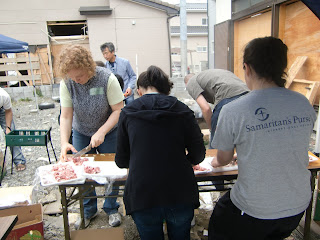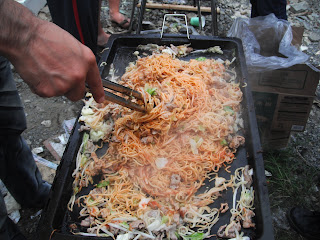Last night on the news, in fact, they gave the results of a survey taken in the disaster area. They asked residents, "Have you recovered?" I felt quite sad at the breakdown of the responses:
1% said they felt they had recovered.
22% said they had recovered a little.
56% said they hadn't recovered very much.
21% said they hadn't recovered at all.
recovery
rɪˈkʌv(ə)ri/
noun
- 1.a return to a normal state of health, mind, or strength."signs of recovery in the housing market"
synonyms: recuperation, convalescence, return to health, process of getting better, rehabilitation, healing, rallying More - 2.the action or process of regaining possession or control of something stolen or lost."a team of salvage experts to ensure the recovery of family possessions"
synonyms: retrieval, regaining, repossession, getting back, recapture, reclamation,recouping, retaking, redemption; More
I wonder if 'recovery' is the right word. Perhaps recovery isn't the goal after all. 'Recovery' suggests going back to the way things once were. For most people in Tohoku, that is impossible--things will never be the same, and much of what was lost were intangibles beyond the obvious loss of life and property, and cannot be regained.
So it would be easy to then err on the side of pushing people to move on from the past, to look ahead to the future, and begin to build their lives, looking forward. That is simplistic, though, as I was reminded in a particularly poignant piece I saw on T.V.
This is a story of a high school class in Otsuchi Town, one of the very hard hit areas of the disaster, where though the high school was on high ground and all the students were safe, many homes and businesses were not. Almost every student in the school experienced loss. The junior class was asked to participate in the rebuilding of their town--to submit ideas to the city planners who were working on their plans for the future of Otsuchi.
Most of the students had ideas for how to make their town better--to encourage the elderly and give them purpose; to make it a happy town, where they celebrate together; to make it a tourist destination, where outsiders can also grow to love Otsuchi. Each of the students featured had a story--a personal connection with the disaster and were being governed in their ideas by that connection.
One girl, though, found she couldn't move forward, she couldn't look ahead. The thought of a new Otsuchi was too painful for her. The plan to raise the level of the city--adding a meter of earth over the surface of the ground to raise it above sea level--felt almost like a personal affront to her. She felt that covering up what used to be would take away so many of her memories, her childhood. She could never stand on a spot and say, 'This is where Grandmother and I walked; this is where I stopped in to visit Grandmother on my way home from school.' The loss of her Grandmother in the disaster was too fresh; to think of losing her town as well was too much.
She said at first, when the assignment came, all she could think was, "I just want everything to go back to the way it used to be."
I'm sure that was more than just a statement, but a cry of the heart, one that is shared by thousands of Japanese who are still in pain, still struggling in the brokenness and loss. It's a cry that is shared by much of humanity, when we are betrayed, hurt or wounded by both circumstances and the people in our lives.
So how do we move forward? How can the people of Tohoku move ahead? How can I move forward when I am wounded, tired or weak?
My hope lies in what God has promised. He will complete all he has set out to do:
"As the rain and the snow come down from heaven, and do not return to it without watering the earth and making it bud and flourish, so that it yields seed for the sower and bread for the eater, so is my word that goes out from my mouth: It will not return to me empty, but will accomplish what I desire and achieve the purpose for which I sent it." Isaiah 55:10-11
This is so hopeful to me. Where I am now is not the end--God is continuing to unfold his plans in me. Where the people of Tohoku are right now is not the end. God's plans for each of those people, families and towns has not been accomplished. It is still unfolding, and he promises to complete what he has begun. This is HOPE! This is better than recovery!
I am so thankful for my friends who live and work in the Tohoku region, being the fragrance of Christ there. It can't be easy--to be good listeners, to walk with people in their pains, to know when to speak and when to stay silent, to wonder if their presence there is making a difference. Would you pray with me for them--that God would strengthen them to love well, to be renewed to press on as we begin the fourth year since 3-11-2011?


































